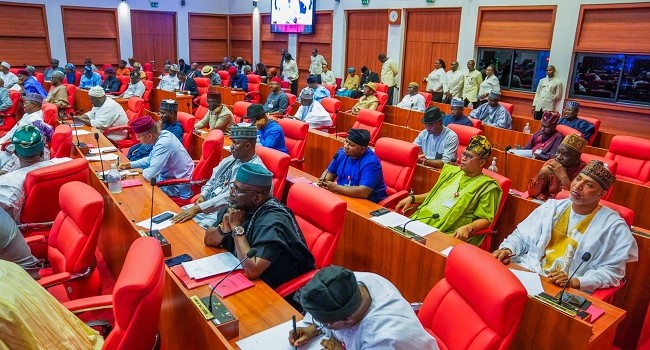Senate Moves To Ban Child Soldiers As Armed Forces Bill Passes Second Reading.
The Senate has moved to outlaw the recruitment of persons under the age of 18 into the military as it passed the Armed Forces (Repeal and Re-enactment) Bill, 2025, for second reading.
The provision, which prohibits the enlistment of minors, aligns Nigeria’s military practices with the Child Rights Act (2003), the United Nations Convention on the Rights of the Child, and the African Charter on the Rights and Welfare of the Child.
The bill, sponsored by Senator Abdulaziz Yar’Adua (Katsina Central), seeks to repeal the existing Armed Forces Act, 2004, replacing it with a constitutionally compliant and operationally responsive law.
Leading the debate on the floor of the Senate, Yar’Adua said the reform was long overdue, underscoring that the current legislation, originally derived from a military decree, no longer meets the demands of modern governance, democratic accountability, or evolving security realities.
“Our Armed Forces are a symbol of national unity and pride, but the laws guiding them have not evolved at the same pace as our democracy. This Bill rebuilds the military’s legal foundation to reflect justice, professionalism, and respect for human rights,” the lawmaker said.
The proposed legislation introduces sweeping reforms, including expanding the definition of military offences, introducing proportionate punishments, and protecting the independence of courts-martial by criminalizing interference from superior officers, a safeguard against abuse of power.
The reform also, for the first time, ensures that legally qualified military officers will be permitted to represent the Armed Forces in civil courts. A standing fund for litigation will also be established to ensure the timely and efficient handling of military-related legal matters.
The bill equally replaces obsolete fines, some as low as N200 or N500, with percentage-based penalties tied to an offender’s salary, ensuring that sanctions remain deterrent and reflective of economic realities.
The reform also clarifies the chain of command and strengthens civilian control of the military. The bill provides clear constitutional guidance by vesting day-to-day operational command of the Armed Forces in the Chief of Defence Staff, under the authority of the President, in line with Section 218 of the Constitution.
This adjustment eliminates ambiguity in command reporting and firmly reinforces the principle of civilian supremacy over the military, a defining feature of all constitutional democracies.
The legislation has been referred to the Senate Joint Committee on Army, Navy, and Air Force to report in four weeks.




